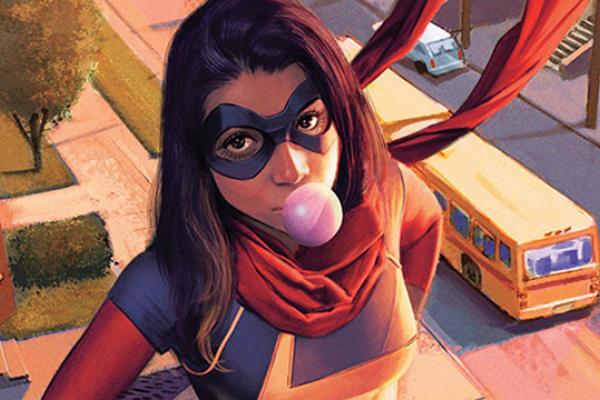I REMEMBER THE FIRST TIME someone told me I couldn’t do something because I was a girl. I was in preschool, preparing for an epic game of Teenage Mutant Ninja Turtles with a group of boys. I was playing April O’Neil, the Turtles’ journalist ally. As we started our game of pretend, my teacher came over to ask what we were doing.
“Playing Teenage Mutant Ninja Turtles,” I responded.
“Oh, you shouldn’t be playing that.”
“But I’m April,” I explained. “I’m a girl.”
“No, girls don’t play games like that,” she told me, and directed me toward the finger paints.
Whatever my teacher’s intentions, the damage was done. From that day on, superheroes and all things related were a “boy thing.” That meant the X-Men, Batman, Superman, and, yes, Donatello and his human-reptile hybrid team were all off-limits. I eventually grew to love comics as a teenager and an adult, but I was aware that they rarely featured anyone other than white men (or, occasionally, heavily objectified women) as the heroes.
Thank goodness for Kamala Khan.
Kamala is the teenage protagonist of Marvel Comics’ rebooted Ms. Marvel series. She’s a clever, funny 16-year-old living in Jersey City, N.J., who, in addition to having superpowers, writes superhero fan fiction, plays video games, and struggles with parent-enforced curfews. She also happens to be the second-generation daughter of Pakistani immigrants and a practicing Muslim.
That’s a lot to chew on, and the stakes for a comic like this—Kamala is the first-ever Muslim superhero to headline a series in mainstream comics—couldn’t be higher. Despite the long odds, however, Ms. Marvel has exploded in popularity, thanks to the series’ talented writer, G. Willow Wilson (herself a convert to Islam), and artist Adrian Alphona. Ms. Marvel #1 has been reprinted seven times, practically unheard of in the comic book industry. The character has inspired costumes, fan blogs, and even activism campaigns.
The comic is fun, with witty dialogue and detailed art. It’s also easy for newer comic readers to understand, a novelty in a genre known for dense plots. But the series’ true strength comes from its heroine, who faces everyday, identifiable struggles. The first conflict Kamala faces in Ms. Marvel isn’t a world-threatening supervillain. It’s whether or not she’ll be able to sneak out to a party with the popular kids.
It’s not just that Kamala is a nerd, or a teenage girl, or a Muslim, or Pakistani-American that makes her stand out, but all of it together. The real message of Ms. Marvel is that for all the things that make Kamala different, she is, at her core, just like the rest of us. Her religion, passions, family loyalty, and ethnic identity all go into making her who she is. Kamala’s attempt to keep these parts of herself balanced is as much a part of the story as whatever villain she’s battling.
“From the get-go, Ms. Marvel addressed Kamala Khan’s experience with a lot of nuance, really bringing to life various aspects of her character,” Slate writer and Ms. Marvel fan Tammy Oler told Sojourners. “I think she’s actually one of the most relatable characters in all of comic books right now. I just can’t help but wish that I had been able to read Ms. Marvel when I was young.”
Behind the mosque
For a big publisher such as Marvel, creating a Muslim superhero in an age of Islamophobia seems like the gamble to end all gambles. But Wilson’s approach to Kamala and her family’s religion is nothing short of genius. It’s a multifaceted take that allows Muslim readers to identify directly with the character and, from an interfaith standpoint, for non-Muslim readers to recognize similar lessons and struggles from their own personal journeys.
The difficulty of identifying as a Muslim and as an American is a situation with which Wilson is intimately familiar. Raised an atheist, she was drawn to Islam in college, and converted while living in Egypt. In an interview a few years ago, Wilson said of her religious and national identities, “To me they’re inseparable. ... I am a Muslim and an American. Politically this is incredibly irritating, but it’s not an identity crisis.”
As Ms. Marvel frequently reflects, religious and national affiliations, and how they inform each other, can be a part of any believer’s inner turmoil. The lessons Kamala picks up from her parents, friends, and the sheikh at her local mosque are lessons all of us learn on the path to spiritual maturity. During her first “good deed” as a superhero, Kamala relates a passage from the Quran that impels her to save the life of a bullying classmate. In another, Kamala’s sheikh encourages her to seek a mentor, suggesting that it will help her to help others by instilling her with compassion and dignity.
Wilson also shows that there are just as many ways to practice Islam as any other religion. Kamala’s brother is devout and conservative. Her father is more progressive. Kamala’s best friend, Nakia, chooses to wear a hijab, but Nakia’s parents wish she wouldn’t. It all goes toward painting a diverse and thoughtful portrait of a religion often portrayed as strange and monolithic.
A desire to change the world
Millennials have grown up with an understanding that they will be responsible for handling the previous generation’s mistakes. What should young teenagers do in the face of issues such as global warming and systemic racism? All this, plus living into parental and societal expectations and keeping those grades up?
The plot of Ms. Marvel’s first two volumes hinges on the pressure and guilt felt by teenagers who are constantly told by the media that they’re not doing enough to correct problems they didn’t create. But Wilson makes an effort to show that Kamala’s generation holds great potential and a desire to change the world, sometimes at great personal cost.
In one story, Kamala encounters a group of teenagers with honorable but misguided intentions. Just like her, they want to save the world, but unlike Kamala, they’ve let themselves be exploited. It’s left up to Kamala to help the group realize their individual worth and importance.
Siddhant Adlakha, a contributor to the website Birth.Movies.Death, sees Ms. Marvel’s handling of these tensions as something that’s relatable to all ages.
“[Ms. Marvel] is also about how today’s kids function in a world created by yesterday’s kids, and the kids before them,” Adlakha told Sojourners. “It’s about how that world is changing, culturally, socially, economically ... which is something people can relate to whether they were born in the ’60s or in 1999.”
Your friendly neighborhood Ms. Marvel
Shortly after Kamala receives her powers, she considers the significance of all these sudden changes in her life. “I wish I could talk to somebody about all this,” she says, “tell somebody that I am equal parts amazed and terrified.”
While Kamala’s talking about the strange abilities she’s manifested, she might as well be talking about the whole experience of growing up. It’s an awkward, alienating process, full of uncertainty. At one time or another, most of us feel like misfits.
Adlakha sees this as the underlying key to Ms. Marvel’s widespread appeal. “It is fun, and crazy, and weird, but it’s also about an outsider. The kind who doesn’t quite feel comfortable in society despite being a part of it,” he said. “It’s about how this person, despite being told otherwise, is capable of making a difference. And really, what’s better than believing you have the power to do good?”
Kamala’s experience of growing up is different from mine. However, we still have much in common, and to me that dichotomy is what makes Ms. Marvel such a successful exercise in diversity for comics. I may not be a teenager anymore, but I remember how much I wanted to fit in during high school. I’m not Muslim, but I understand trying to discern God’s calling, sometimes through great opportunities and sometimes through situations we can’t comprehend. And I’m certainly thrilled that a high-profile girl in comics can be strong, smart, religious, and unafraid to be herself.
Kamala Khan isn’t just a hero in the masked, costumed, butt-kicking-the-bad-guys sense. She, and her creator G. Willow Wilson, are heroes in a simpler way, by reminding us that being an outsider is okay. Standing up for fellow outsiders, whether it’s in your faith, ethnicity, or age group, can make someone heroic. Of course, Kamala’s already said this, and said it better: “A hero is just somebody who tries to do the right thing even when it’s hard. There are more of us than you think.”

Got something to say about what you're reading? We value your feedback!

